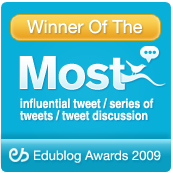I am anticipating that this post may be among the most unpopular posts I will write as a blogger. My position on this topic certainly did not win me the “most popular guy” award when I was a secondary teacher. I remember when Barry Goldwater ran for President; there was a saying that “He would rather be right than be President”. That was a testament to the man’s core beliefs. That seems to be a dying quality given the examples of politicians today. The point however is that sometimes there are issues that we must hold true to, even at the expense of our own popularity or acceptance by others.
As teachers, we accept the fact that we have to put aside our political beliefs in the role as educator. For the most part educators accept the fact that politics and education should be separated. We need to do this to explore critical thinking. We can talk about issues when appropriate, but hopefully, it will be in a fair and unbiased discussion of the facts and not the politics of an issue. Most educators accept this and support it as a concept. As a highly opinionated person, I often found this to be one of my most difficult goals to accomplish, but I believed that it was an imperative that I had to follow. I believe that most educators agree that there are some things that should not be brought into the classroom in order to maintain and promote an atmosphere for academic discussion free of negative influences of any kind. Of course there are subject-specific cases in social studies classes where political discussions might be appropriate.
As an educator, my observation of educators is that they are caring individuals who are people oriented. They love to teach and they love to help mankind in general. Helping people is in their DNA. It is that very trait that is the main cause driving too many educators to often for very good reasons do a very bad thing. Today, with our economy in the state that it has been in for the last few years, there are many opportunities for people to involve themselves with charitable projects either as individuals or as part of a group. Some of the most effective contributors to charities are individuals with access to groups of people. It enables them to access their sources for money, goods, or labor to help any charitable organization. The causes are always good with a heartfelt need for support. That is the problem.
Teachers, or administrators enlist kids in these efforts to help with all of the best of intentions. I agree that we should instill in kids the willingness to give and to help others. I must draw the line however at how we accomplish this. Too often some believe that in the name of charity that the end justifies the means. There are educators who tie children’s participation in a charitable event to the grade those kids will receive on a paper, project, or class participation grade. Ultimately, a student’s participation in a teacher’s selected charity, no matter how worthwhile a cause, will be reflected in a grade that is supposed to reflect student learning in a specific subject. Of course it is even more egregious when administrators support the efforts in the same manner on a school wide basis. I don’t know about other states, but this is against the law in New York.
To oppose this injustice to kids is usually translates to opposing a specific charity or even the act of charity itself. That is what makes dealing with this so difficult. I oppose it because it makes some kids uncomfortable. I oppose it because now, it places kids, whose families may be struggling financially, at an academic disadvantage. I oppose it because teaching should be about learning and not if kids can take stuff from home to give to a teacher’s cause. Few kids own money or goods. They get stuff from their families. If the families do not have it to give, why should the kids be put in a position to feel that pain and then be penalized academically for that as well? They can’t get that extra credit that the other more financially capable kids are privileged to obtain. The fact of the matter is that many of the kids being asked to give, might very well be the recipients of charities themselves.
How to give is an important lesson. We should all learn that lesson and learn it well. However, we should not, as educators, attach a grade of any kind, for any reason to anything a kid does or doesn’t do in the name of charity. As much as we believe in a cause or charity we shouldn’t cram our beliefs down the throats of others especially if they can’t afford it. We can have collection areas for goods and money in common areas but not specific classrooms where people keep track of who contributes and who doesn’t. That maintains contributions and the dignity of individual students.
Now, I must go off to have a discussion with one of my daughter’s teachers, the thought of which prompted this post. This usually is a topic at Christmas time, but the economy being what it is, has focused this subject to be a more year-round discussion with more and more caring educators. And so goes the decline in my popularity, and reputation as a humanitarian. I do believe that as educators, if we are to have grades at all, they should never reflect whether or not a child’s family can support a charity.











